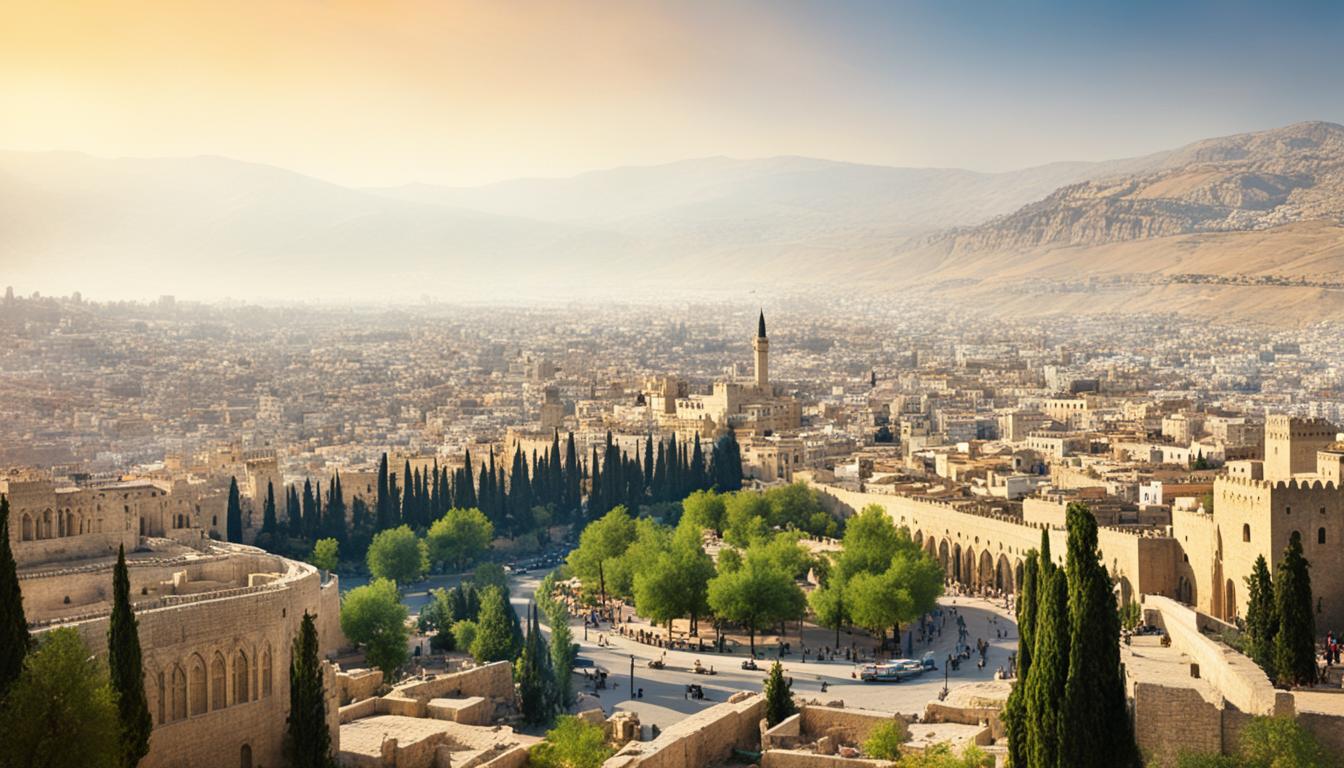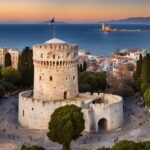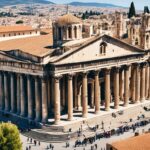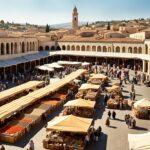Damascus, one of the oldest cities in the world, holds great historical significance as the capital of Syria. Situated on the edge of the Syrian-Arab desert, this beautiful city played a significant role in both the Old and New Testaments. It is best known as the place where the apostle Paul had his dramatic encounter with the risen Christ and converted to Christianity.
Damascus was strategically located at the crossroads of major trade routes, making it a prosperous and influential city at the time. Its biblical significance can be seen in numerous references throughout religious texts, showcasing its prominence in the biblical narrative.
In this article, we will explore the biblical Damascus, its historical role, and delve into the biblical references and significance of this ancient city.
Key Takeaways:
- Damascus is one of the oldest cities in the world and holds great historical significance as the capital of Syria.
- The city played a significant role in both the Old and New Testaments, particularly as the site of the apostle Paul’s conversion.
- Damascus was strategically located at the crossroads of major trade routes, which contributed to its prosperity and influence.
- The biblical significance of Damascus is evident through numerous references and stories found in religious texts.
- Exploring the biblical references and significance of Damascus provides a deeper understanding of its role in religious history.
Geographical Location of Damascus
Damascus, one of the oldest cities in the world, is located in modern-day Syria. Situated on the northeastern edge of the Syrian-Arab desert, it holds a prominent place in the Middle East. The ancient city of Damascus is approximately 130 miles northeast of Jerusalem and around 50 miles from the Mediterranean coast. Its strategic geographical position contributed to its historical significance and influence in the region.
Damascus stands at the intersection of two major international highways, the Via Maris and the King’s Highway. This favorable location made it a pivotal commercial and transportation center in ancient times, connecting different civilizations and facilitating trade routes between Asia, Europe, and Africa. As a result, Damascus thrived as a bustling hub where diverse cultures converged.
| Location | Description |
|---|---|
| Middle East | Damascus is situated in the Middle East, in the country of Syria. It has been a vital city in the region for centuries. |
| Syria | The location of Damascus within the borders of modern-day Syria further emphasizes its historical and cultural significance. |
| Ancient City | With its roots dating back thousands of years, Damascus holds the status of an ancient city, carrying the remnants of ancient civilizations. |
As we explore the biblical, historical, and cultural aspects of Damascus, understanding its geographical location and its role in the Middle East becomes pivotal in grasping its enduring significance.
Historical Significance of Damascus
Damascus, with its ancient roots, holds great historical significance. Mentioned multiple times in the Bible, this city played a pivotal role in various eras, including the biblical era. From the rescue of Lot by Abraham from kings who had captured him to the conflicts between different kingdoms and the Israelites in the Old Testament, Damascus was intricately linked to significant historical events. It saw the rise and fall of empires, being conquered and ruled by prominent figures like King David and King Solomon. Despite its destruction and subsequent rebuilding, Damascus continued to exert its influence and maintain its cultural importance even through the New Testament era.
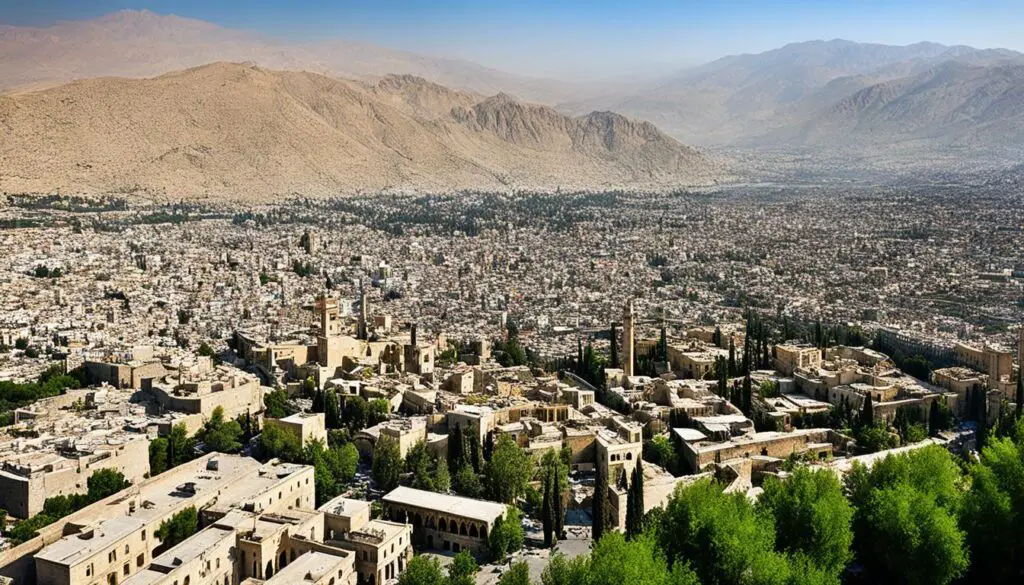
Key Points:
- Mentioned multiple times in the Bible
- Played a pivotal role in conflicts between kingdoms and the Israelites
- Conquered and ruled by prominent figures like King David and King Solomon
- Continued to maintain cultural importance through the New Testament era
Key Biblical Events Involving Damascus
Damascus, the ancient city rich in biblical history, is prominently featured in several key events documented in the Bible. These events shed light on the city’s significance and its role in biblical narratives throughout the Old and New Testaments.
One of the earliest references to Damascus is in the account of Abraham’s heroic rescue of his nephew Lot. Damascus is mentioned in connection with the conflict between Israel and the Aramaean confederacy, cementing its historical importance.
Furthermore, Damascus became the capital of the kingdom of Aram Damascus, playing a central role in the geopolitical landscape of the region. It was this kingdom that often opposed the Israelites, leading to significant confrontations and power struggles.
A notable event in Damascus involves Naaman, the Syrian commander who sought healing from his leprosy. Through the prophet Elisha, Naaman found restoration and cleansing, a testament to the power of faith and divine intervention.
However, one of the most significant biblical moments in Damascus occurred with the apostle Paul. As Saul of Tarsus, he embarked on a journey to Damascus to persecute Christians, but on the road, he encountered Jesus Christ in a blinding light. This encounter forever changed his life, leading to his conversion and subsequent proclamation of the Gospel.
“I fell to the ground and heard a voice say to me, ‘Saul! Saul! Why do you persecute me?’” – Acts 22:7
This pivotal event not only transformed Paul’s life but also marks the beginning of his extensive missionary journeys and contributions to the early Christian church.
The presence of Damascus in these key biblical events highlights its prominence in religious narratives and underscores its role in shaping the faith and beliefs of believers throughout history.
Damascus in the Bible: Key Events
| Event | Location | Reference |
|---|---|---|
| Abraham’s rescue of Lot | Damascus | Genesis 14:15-18 |
| Conflicts between Israel and Aram Damascus | Damascus | 1 Kings 15:18-20 |
| Naaman’s healing from leprosy | Damascus | 2 Kings 5:1-19 |
| The conversion of the apostle Paul | Road to Damascus | Acts 9:1-19 |
Archaeological Discoveries in Damascus
Archaeological excavations in Damascus have revealed a treasure trove of historical artifacts and ancient ruins, shedding light on the city’s fascinating past. These discoveries provide invaluable insights into the urban development and cultural practices of Damascus throughout the centuries.
Among the notable findings are the remains of ancient temples dedicated to pagan gods, offering a glimpse into the religious beliefs of the city’s inhabitants. The excavation of ancient city walls and fortifications has uncovered evidence of the city’s strategic importance and its role as a center of power and defense.
One remarkable Roman-era structure discovered in Damascus is the Damascene Temple of Jupiter. This grand temple, dedicated to the supreme Roman deity, showcases the architectural prowess of the time and offers a glimpse into the religious practices of that era.
These archaeological treasures not only provide a glimpse into the city’s ancient past but also contribute to our understanding of the wider historical context of the region. They are a testament to the rich cultural heritage and historical significance of Damascus.
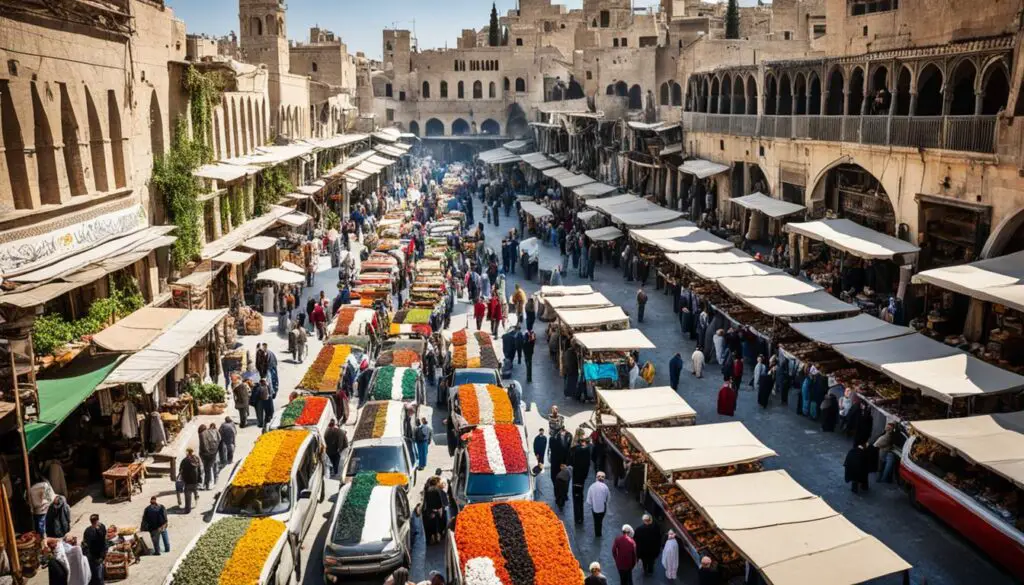
Notable Archaeological Discoveries in Damascus:
| Artifact/Structure | Description |
|---|---|
| Ancient Temples | Remnants of temples dedicated to pagan gods, showcasing religious practices in ancient Damascus. |
| Ancient City Walls and Fortifications | Evidence of the city’s strategic importance and defense mechanisms. |
| Damascene Temple of Jupiter | A Roman-era temple dedicated to the supreme deity of the time, highlighting the architectural brilliance of ancient Damascus. |
Theological Themes in Relation to Damascus
Damascus, as portrayed in the Bible, holds great religious significance and symbolizes various theological themes. The biblical accounts intertwined with Damascus convey important spiritual lessons, emphasizing God’s judgment, mercy, and the power of repentance and conversion.
Theological Themes:
- God’s Sovereignty: The historical and biblical references to Damascus highlight God’s sovereignty over nations and His providential control. Despite its former prosperity and influence, even Damascus could not escape God’s divine plans and purposes.
- The Consequences of Rebellion and Disobedience: The narrative surrounding Damascus serves as a reminder of the consequences that arise from rebellion and disobedience against God. It stands as a cautionary example of the ultimate end that awaits those who oppose His will.
- The Power of Repentance and Conversion: Damascus also presents a powerful illustration of how an encounter with God can lead to repentance and conversion. The story of the apostle Paul’s transformative experience on the road to Damascus demonstrates the life-changing power of encountering the risen Christ.
“…suddenly a light from heaven flashed around him. He fell to the ground and heard a voice saying to him, ‘Saul, Saul, why do you persecute me?’ And he said, ‘Who are you, Lord?’ And he said, ‘I am Jesus, whom you are persecuting.’” – Acts 9:3-5
Through the biblical teachings about Damascus, believers are encouraged to reflect on these theological themes and apply the lessons to their own lives. Just as Damascus experienced God’s judgment and redemption, individuals are reminded of the consequences of their actions, the need for repentance, and the transformative power of encountering Jesus.
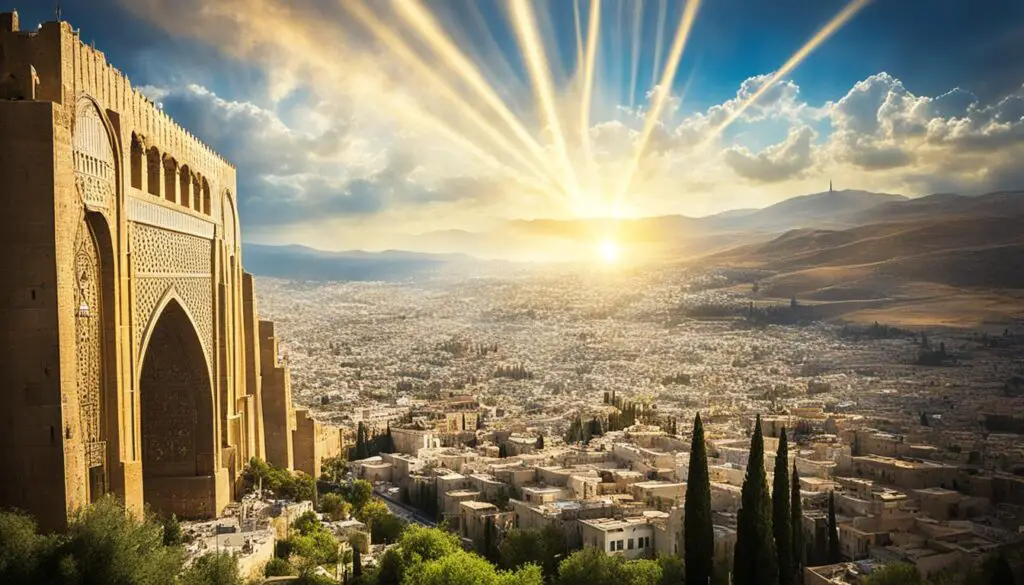
Cultural and Religious Practices in Damascus
Damascus, one of the oldest cities in the world, was not only a political and economic hub but also a vibrant center of culture and religious practices. With its diverse population and rich heritage, the city was a melting pot of traditions, rituals, and festivals.
The Jewish community in Damascus was substantial, and the city boasted numerous synagogues. The Jewish people played a vital role in shaping the cultural tapestry of Damascus, contributing to its unique identity.
“Damascus was a city of many cultures and faiths, where people from different backgrounds coexisted and enriched one another’s lives. The synagogues were not only places of worship but also served as community gathering spaces, fostering unity and shared experiences.”
The architectural splendor of Damascus was another testament to its cultural significance. Magnificent structures showcased the city’s rich heritage and served as a visual representation of its past glory. The remarkable blend of architectural styles, influenced by various civilizations that ruled Damascus throughout history, was a true testament to the city’s cultural heritage.
The marketplace in Damascus, known as the “Souq,” was a bustling hub of trade and cultural exchange. Here, visitors and locals alike experienced the vibrant atmosphere, diverse merchandise, and traditional crafts. The Souq played a crucial role in preserving ancient trading practices and keeping traditional craftsmanship alive.
Ancient Rituals and Festivals
Religious rituals and festivals were integral to the social fabric of Damascus. The ancient traditions of the city were deeply rooted in the religious beliefs practiced by its residents. These rituals provided an opportunity for community bonding and spiritual reflection.
One such festival was the annual Spring Festival, timed to coincide with the blooming of flowers and the arrival of warmer weather. This vibrant celebration brought the community together, featuring music, dance, and colorful displays of flowers and decorations.
The Ramadan traditions in Damascus were deeply cherished by the Muslim population. Families gathered for evening meals as they broke their fast together, fostering a sense of unity and gratitude.
| Ancient Traditions of Damascus | Key Elements |
|---|---|
| Eid al-Fitr | A festive celebration marking the end of Ramadan, featuring prayers, feasts, and acts of charity |
| Sabbath | Special day of rest and worship observed by the Jewish community, with rituals and prayers |
| Feast of St. Paul | A Christian feast day honoring the conversion of the apostle Paul in Damascus, celebrated with prayers, processions, and special services |
The ancient traditions of Damascus served as a link to the past, preserving cultural practices and religious customs that have been passed down through generations. These rituals and festivals continue to be celebrated in modern-day Damascus, keeping alive the city’s rich heritage.
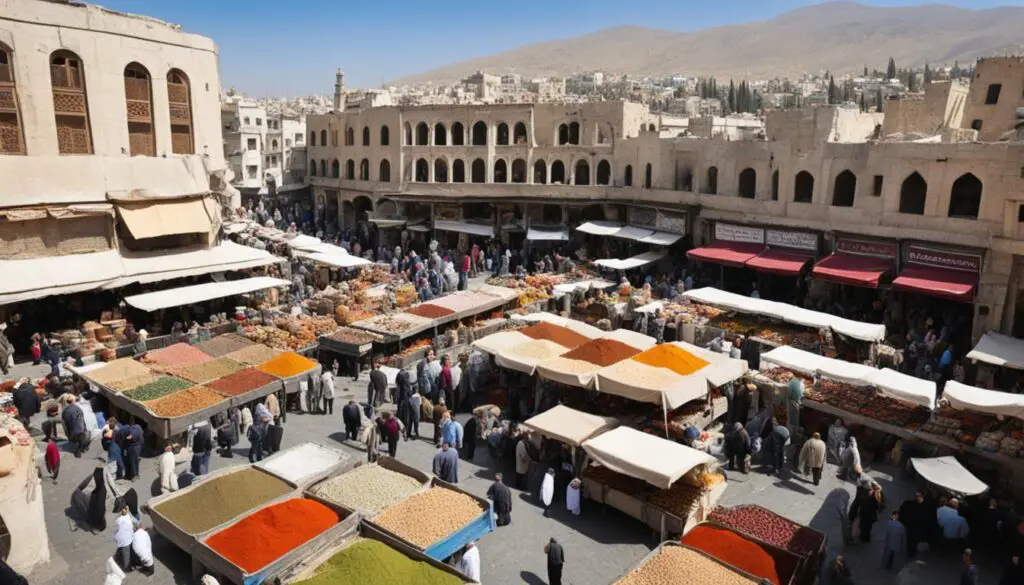
Prophetic and Eschatological Significance of Damascus
Damascus holds great prophetic and eschatological significance in the Bible, particularly in relation to the end times. The book of Isaiah contains a prophecy stating that Damascus will be reduced to ruins. While this prophecy may have been partially fulfilled in ancient times, many scholars believe that it also has a future fulfillment related to the events leading up to the end times.
The destruction of Damascus is viewed as a sign of God’s judgment and the fulfillment of biblical prophecies. It is seen as a significant event that will unfold during the eschatological period, signaling the culmination of God’s divine plan for humanity.
“Behold, Damascus will cease to be a city and will become a heap of ruins.” – Isaiah 17:1
This prophecy has captivated the attention of theologians and biblical scholars, who have sought to interpret its meaning and explore its implications. It serves as a poignant reminder of the unpredictable nature of the future and the ultimate sovereignty of God.
As we contemplate the prophetic significance of Damascus, it is essential to approach it with humility and discernment, recognizing that biblical prophecies can have literal, symbolic, or metaphorical dimensions. While the specifics and timing of the future destruction of Damascus remain uncertain, the biblical prophecies surrounding it remind us of the overarching theme of God’s judgment, mercy, and ultimate redemption.
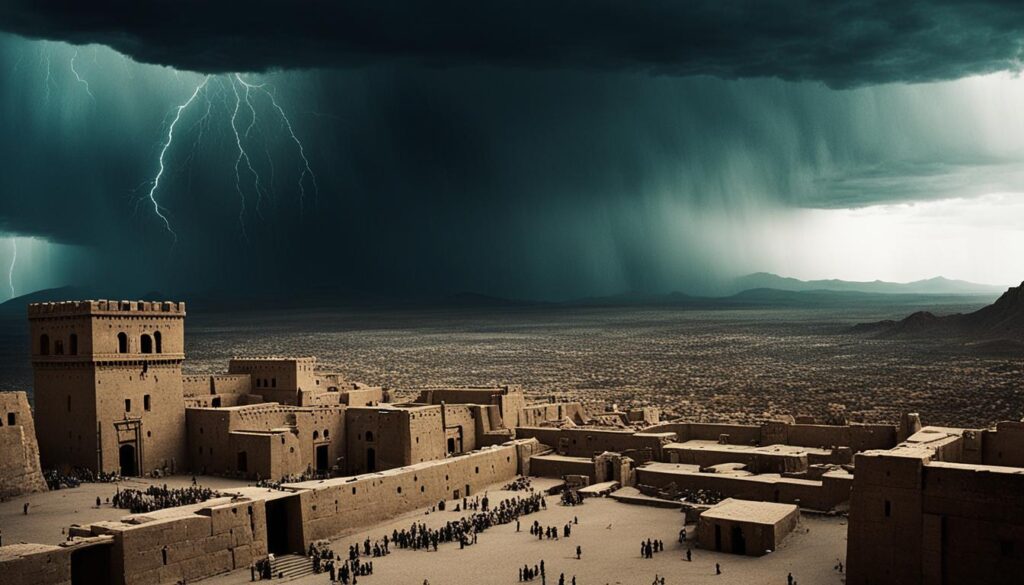
Role of Damascus in Biblical Prophecy
According to biblical prophecy, Damascus plays a significant role in future events. The books of Isaiah and Jeremiah contain verses that speak of Damascus becoming a heap of ruins. These prophecies have led many to interpret them as referring to a future event linked to the end times. However, the specific details and timing of this event remain a subject of interpretation and debate among biblical scholars and theologians.
Conclusion
Damascus, a city with deep biblical roots, holds immense historical and theological significance. Throughout the Old and New Testaments, Damascus played an integral role in key biblical events, serving as a backdrop for God’s work in the lives of His people. From Abraham’s rescue of his nephew Lot to the conversion of the apostle Paul, Damascus holds a unique place in religious history.
Not only does Damascus have a rich biblical significance, but it is also supported by tangible evidence found through archaeological discoveries. The ruins and artifacts unearthed in this ancient city provide a window into its vibrant past and affirm its historical role as a hub of culture, trade, and spiritual practices.
Understanding the biblical significance of Damascus deepens our appreciation for its place in religious heritage and enhances our understanding of the Bible as a whole. It reminds us of the enduring power of Scripture and the way in which real places and events shape our faith. As we explore the historical role of Damascus, we recognize its significance in the unfolding narrative of God’s redemptive plan for humanity.
FAQ
What is the biblical significance of Damascus?
Damascus holds great historical and theological significance in the Bible. It is mentioned multiple times in both the Old and New Testaments and is associated with key biblical events, such as Abraham’s rescue of his nephew Lot, Paul’s conversion to Christianity, and the healing of Naaman. Additionally, the city carries prophetic implications in biblical prophecy.
Where is Damascus located?
Damascus is located in modern-day Syria, on the northeastern edge of the Syrian-Arab desert. It is approximately 130 miles northeast of Jerusalem and around 50 miles from the Mediterranean coast. Its strategic geographical position made it a bustling commercial and transportation center in ancient times.
What is the historical significance of Damascus?
Damascus is one of the oldest cities in the world, with a rich history dating back to ancient times. It served as the capital of Syria and played a crucial role in the conflicts between various kingdoms and the Israelites in the Old Testament. Despite being destroyed and rebuilt multiple times, Damascus maintained its influence and cultural significance even into the New Testament era.
What are some key biblical events involving Damascus?
Damascus is mentioned in connection with Abraham’s rescue of his nephew Lot, as well as the conflicts between Israel and the Aramaean confederacy. It was the capital of the kingdom of Aram Damascus and played a significant role in biblical narratives. Damascus is also where Naaman, the Syrian commander, encountered the prophet Elisha and was healed of leprosy, and where the apostle Paul had his life-changing encounter with Jesus Christ.
What have archaeological excavations in Damascus revealed?
Archaeological excavations in Damascus have unearthed numerous artifacts and structures that provide insights into the city’s rich history. Some notable discoveries include ancient temples dedicated to pagan gods, ancient city walls and fortifications, and Roman-era structures such as the Damascene Temple of Jupiter. These findings help us better understand the urban development and cultural practices of Damascus throughout the centuries.
What theological themes are associated with Damascus?
Damascus carries theological significance in the Bible. It serves as a backdrop for themes such as God’s sovereignty, the consequences of rebellion and disobedience, and the power of repentance and conversion. The biblical accounts intertwined with Damascus convey important spiritual lessons and emphasize God’s judgment and mercy.
What cultural and religious practices were prominent in Damascus?
Damascus was not only a political and economic hub but also a center of culture and religious practices. It had a large Jewish community and numerous synagogues. The city was known for its cultural diversity, architectural splendor, and vibrant marketplace. Religious rituals, traditions, and festivals were an integral part of the social fabric of Damascus.
What is the prophetic significance of Damascus?
According to biblical prophecy, Damascus will face further destruction in the future. While the city has experienced past destruction, some believe that the prophecies in the books of Isaiah and Jeremiah point to a future event linked to the end times. The destruction of Damascus is seen as a sign of God’s judgment and the fulfillment of biblical prophecies.
What role does Damascus play in biblical prophecy?
Damascus is mentioned in biblical prophecies that speak of its future destruction. Verses in Isaiah and Jeremiah describe Damascus becoming a heap of ruins. Many interpret these prophecies as pointing to a future event related to the end times. The specific details and timing of this event remain a subject of interpretation and debate among biblical scholars and theologians.
What is the conclusion regarding the biblical significance of Damascus?
Damascus, an ancient city with deep biblical roots, holds immense historical and theological significance. Its role in key biblical events, archaeological discoveries, theological themes, cultural practices, and prophetic implications all contribute to its importance in religious history and scripture.
